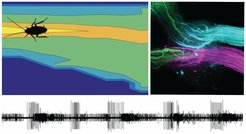Active sensing and decision-making in insects

Abstract We are looking for a highly motivated candidate for a PhD project, studying active sensing strategies in cockroaches.
Active exploratory antennal movement is involved in a range of sensory guided behaviors. This project will employ computer vision to track the motion of antennae, and body posture, as cockroaches make movement decisions across a range of ecologically relevant contexts, and in the face of uncertainty, perceived risk and time constraints. In particular we will consider the multi-modal nature of decision-making (e.g. integrating olfactory and tactile cues) and the role of consistent inter-individual differences, previous experience and social context. Integrating behavioral experiments, electrophysiology and computer simulations, this project aims to reveal the neural basis of decision-making in cockroaches. Understanding how natural systems implement fast and robust active sensing and decision-making will offer direct inspiration for new implementations in autonomous robots.
We welcome candidates from a wide range of backgrounds (quantitative biology, engineering science, physics, computer science), but it is essential that candidates are motivated to understand biological phenomena. Candidates also ideally already hold a Masters degree.
The research will be undertaken in the department of Neurobiology, University of Konstanz and the Max-Planck Institute for Ornithology advised by Dr. Einat Couzin-Fuchs and Prof. Dr. Martin Wikelski. It is anticipated that the successful candidate will be part of the International Max Planck Research School (IMPRS) of Organismal Biology, a competitive doctoral training program offering laboratory courses and workshops in the fields of behavior, ecology, evolution, physiology and neurobiology with other 64 Ph.D. international student fellows from 27 countries.
The University of Konstanz and the Max Planck Society are equal opportunity employers that try to increase the number of women in research and teaching. As family-friendly institutions, they are committed to further the compatibility of work and family life and prefer disabled applicants when qualification is equal.
Keywords active sensing, inter-individual differences, social learning, insects, motor control.
Supervisors Einat Couzin-Fuchs, University of Konstanz and Martin Wikelski, Max Planck Institute for Ornithology + University of Konstanz
